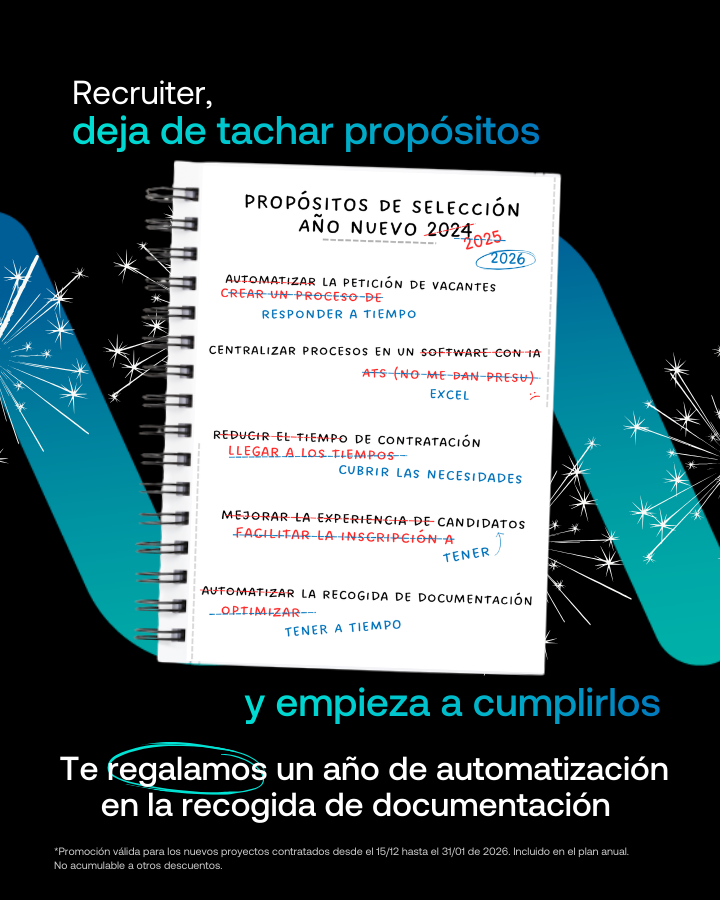Quiet Quitting in HR

The famous term “Quiet Quitting” is used to refer to doing the job you were hired to do, without overwork. This concept consists of breaking with overtime and additional tasks, in other words, giving up effort beyond what your job truly requires.
This “silent resignation” comes after the “great resignation” or “great resignation”, the labor phenomenon, which seriously spread in the United States in the summer after the pandemic.
The adaptability of businesses and the trend of remote work generated questions and changes in employees, especially among the youngest, who are not willing to work more for the same salary or to impress, but who seek a balance to carry out their work activity, but also to enjoy their free time.
TikTok, Instagram or Twitter are burning with the new work phenomenon that is already penetrating Generation Z.
Is it the law of least effort? , Is the employee not meeting the company's objectives? Is it simply doing what's right to not get fired? , Living to work or working to live? All of these questions flood the intense debate that is growing on social networks.

What is Quiet Quitting?
Quiet quitting is translated as “silent resignation”, which has become popular especially among young people, because it's about working just enough and not being overworked.
Quiet Quitting does not mean that an employee is going to leave their job, but rather it refers to limiting tasks to those described in their position, to avoid working longer hours and to establish clear limits to improve work-life balance.
However, Quiet Quitting could be a sign that the employee is not comfortable in the company or their position.
Over the past few years, people have begun to think about their careers, salaries and how they are treated at work. The lack of opportunities for promotion, low salaries and feeling undervalued and respected are the main reasons that motivated the “GREAT RESIGNATION”, according to a survey by Pew Research Center.
How does it affect companies?

It represents a loss of flexibility, motivation, well-being and pace of work. It's not just overtime that should be paid, it's mostly about attitude at work.
More and more organizations are committed to creativity and rely on their employees to create strategies for well-being and fulfillment.
However, Quiet Quitting demonstrates that there is an immediate need in the work system. Because at this rate, companies could quickly lose competitiveness without realizing it.
What are the behaviors of Quiet Quitters?
Although, by definition, they tend to be discreet, there are some signs that can alert us:
Disengagement from work
The amount of effort someone is willing to put into their work is often linked to how committed they feel to the company.
Being less available, leaving earlier and arriving late, or deleting email from your phone can be an early sign that you're no longer as committed to work as you used to.
Lack of initiative
When an employee usually takes the initiative to lead projects or take on new responsibilities, and suddenly stops doing so, it's a sign that something is wrong, they can go from having all the ideas and solutions to just doing the things they're told to do.
It can happen suddenly, or it could be a gradual process through which an employee's habits and behaviors change.
Isolate yourself from the rest of the team
It's not unusual for an employee who is in the midst of silent abandonment to stop interacting with their colleagues. This can range from spending less (or no) time participating in conversations or not attending internal events, to having lunch alone, when they would normally eat with their classmates.
This can lead to a loss of trust on the part of the team.


How HR can help tackle Quiet Quitting
Understand that it is a real problem, so we must pay attention to it and not approach it as a fad.
Work projection: If Quiet Quitting appears, it means that there is a resignation on the part of the employee to the possibilities of growing in the organization. HR should choose to clarify the career lines of employees, in particular key talents. Uncertainty is synonymous with a lack of motivation for the worker.
Digital disconnection: Establish rules with team leaders so that they don't assault employees outside of work hours. Rest and balance in each person's life are important and we shouldn't interrupt them.
Benefits: Grant some corporate benefits such as discounts, food tickets, or grants for transportation and studies.
Mental Health: Quiet quitting appears more severely in people with the syndrome of Burn Out, It is important that when companies go through a crisis that requires more productivity, they have strategies to help with that work overload.
Time flexibility: Freedom of time is the best thing you can offer your team, demonstrating trust in them and their work.
Recognition: Good work deserves to be recognized. Demand without recognition creates discomfort and demotivation.

Nothing is definitive, yet no one should feel compelled to do more than they can. The motivation to give extra effort cannot be the norm, but if we want this to happen, then, as companies, we must set the right conditions for it.
.jpg)
Fulfill your selection purposes
Recruiter, fulfill your recruitment purposes in 2026 with the help of Velora. And as a gift, a free year on automatic document request.

Related articles
More articles to inspire your HR strategy









